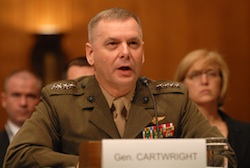Gen. Cartwright: Iran Likely At Least Three to Five Years From Developing A Deliverable Nuclear Weapon
April 16, 2010
Featured Image
We are happy to serve you a daily summary of the top nuclear policy stories each morning, with excerpts from the stories in bullet form.
Stories we're following today, Friday, April 16, 2010:
Yes Virginia, Three to Five Years - Nukes of Hazard [link]
- Yesterday, a disturbing exchange took place between Vice Chairman of the Joint Chiefs of Staff, Gen. James Cartwright, and the members of the Senate Armed Services Committee.
- During his testimony, Army Lt. Gen. Ronald Burgess reported that Iran could potentially produce enough highly enriched uranium for a nuclear bomb within one year. This led a number of SASC committee members to assume that Iran could have a deliverable weapon within one year. Were it not for Committee Chair Sen. Carl Levin, they may have held on to that assumption. Apparently wise to the fact that there are a few more steps involved in the process, Levin asked for further clarification.
- Gen. Cartwright responded that it would take “another two to three, potentially out to five years to move from the idea of having the material to… something that can actually create a detonation, an explosion that would be considered a nuclear weapon.” Cartwright went on to clarify for Levin that, should the enrichment of uranium and the development of a weapon take place simultaneously, “experience says that it’s gonna take you three to five years.”
- To read the full prepared testimony of Michele Flournoy, William Burns, General Cartwright and Lt. General Burgess, please click here.
New START Treaty Good for US Missile Defense: US General - AFP [link]
- A new US-Russian arms reduction treaty will be beneficial for US missile defense capacity, the head of the US Missile Defense Agency told congressional critics of the agreement on Thursday.
- "The new START treaty actually reduces constraints on the development of the missile defense program," Missile Defense Agency (MDA) head Lieutenant General Patrick O'Reilly told the House of Representatives subcommittee on strategic forces.
Obama's Vision Has Turned into Concrete Victories - Alex Bell in The Hill's Congress Blog [link]
- President Obama has devoted a major portion of his presidency to dealing with the threat of nuclear proliferation – the Prague speech, successful meetings at the United Nations, new negotiations on arms reductions with Russia – but it is the last two weeks where Obama’s vision has turned into concrete victories.
- First up was the long anticipated Nuclear Posture Review (NPR).
- Second on deck were the 23,000 nuclear weapons that still exist around the globe. As a first step in tackling this, President Obama signed the New START treaty with Russia that will reduce excess nuclear weapons in the US and Russia, while leaving the US and its allies with a safe and robust deterrent.
- The administration finished by hosting 47 world leaders at the Nuclear Security Summit.
- Indeed, without the benefit of outside-the-beltway accolades – let alone a widespread “reduce the nukes!” movement – Obama has laid out a pragmatic, strong nuclear policy roadmap that can revamp and revitalize the nonproliferation regime that has been on the edge of collapse for a decade.
Coming Issues Make 'No' A Riskier Strategy for GOP - Wall Street Journal [link]
- One way of looking at U.S. politics is to see it as an endless cycle of the two parties taking turns overplaying their hands.
- Now the question is whether Republicans are about to make a similar mistake. The question arises in large measure because two of the issues ahead—ratification of an arms-reduction agreement with Russia and confirmation of a Supreme Court nomination—have traditionally produced shows of bipartisanship.
- On the nuclear-arms pact, it's too early to tell exactly what posture Republicans will adopt. The deal was signed by the president just a week ago, and Senate aides say it may be the fall before a ratification vote can be held.
- Meantime, though, Secretary of State Hillary Clinton has made a point of reminding Republicans—and, by extension, voters—that partisanship often is put aside in arms-control votes. On the day the treaty was completed, she noted that the last three major nuclear-arms treaties were approved in the Senate by votes of 95-0, 93-6 and 93-5.
Cold War Nuclear Fears Now Apply to Terrorists - New York Times [link]
- It has become conventional wisdom, repeated by President Obama at the nuclear summit meeting this week, that the cold war danger of huge strikes by thousands of nuclear missiles has given way to a new threat: terrorists killing tens of thousands of Americans with a stolen or homemade nuclear device. A broad range of security experts agree that nuclear terrorism may well be the most serious danger the United States faces today.
- But it is not new. In fact, almost from the invention of the atomic bomb, government officials were alarmed by the threat that compact nukes would be smuggled into the United States by Soviet agents and detonated.
- Hundreds of pages of declassified documents from the 1950s, obtained by The New York Times from the F.B.I. under the Freedom of Information Act, lay out a strikingly familiar story, in which Communist agents played the role of today’s Al Qaeda.
- Most security experts believe the focus in recent years on destroying or locking up nuclear material is far more effective than sealing American borders. The global effort to reduce the threat was advanced at the summit meeting in Washington this week, with commitments from many countries to destroy or secure supplies of plutonium and highly enriched uranium.
The Lighter Side
Weapons of Mass Destruction Summit - Mike Luckovich in the Atlanta Journal-Constitution (via Slate) [link]



